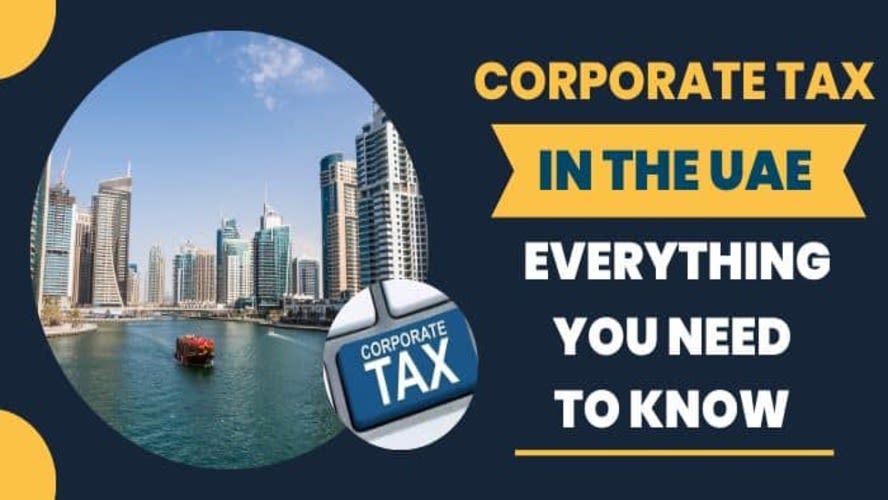
What Is Corporate Tax?
The corporate tax, also known as company tax, is a tax on the profits of a corporation. These taxes are computed by UAE authorities and apply to all business and commercial activities throughout the Emirates.
Recently, the Ministry of Finance (MOF) of the Emirates announced tax reforms requiring most businesses to pay corporate taxes. Beginning in June 2023, this corporate tax law will impose taxes on all commercial activities in the UAE.
Despite corporate tax reforms being a novel requirement for the UAE, business owners and prospective investors will be expected to have a working knowledge of the processes and requirements.
If you’re interested in learning more about the Dubai corporate tax rate 2023, stick around! We'll walk you through these fundamental changes so that you and your business are always in the know.
When Will Corporate Tax Start in the UAE?
The launch of corporate taxation is a massive undertaking by UAE to expand foreign direct investment and fuel the evolving economy. It’s slated to become effective June 1, 2023, with corporations being charged a rate of 9% on their profits.
Despite this tax reform effectively changing the landscape of UAE business, other tax sectors will remain unaffected. Individuals still won't be required to pay personal income taxes, and most other tax rules will continue as is.
This is a massive change for many businesses in a region that has long enjoyed a tax-free environment, but it seems to be a step in the right direction for ensuring the overall longevity of the UAE business market.
Why Did the UAE Establish Corporate Taxes?
Corporate tax reform in the UAE is a deliberate effort to diversify the budget and loosen the region's dealings with oil. The UAE's main economic driver is petroleum production, a reliance the nation has heavily invested in abandoning. Corporate taxes are a large part of that strategy, promoting revenue streams and placing distance on this historical dependence.
Additionally, this sudden change to the tax code is meant to invigorate the business market and prepare the region fiscally for global digitization.
What Businesses Are Affected by Corporate Income Tax
When passed, the criteria for tax percentages were set at:
- 0% tax on profits between AED 0 – AED 375,000
- 9% tax rate on profits above AED 375,000
The press release for this tax reform also indicates that there will be varying tax rates for large multinational corporations. International industries will also be responsible for paying corporate taxes if they bring in profits exceeding EUR 750 million.
This system will levy taxes on net profits recorded in financial statements by each business organization. Tax losses can be carried over to offset future taxable income.
What Business Types are Not Affected by Corporate Income Tax?
Individuals in the UAE are still not required to be taxed on income from employment, investments, or other personal income. Tax exemptions will also be applied for investors that do not directly conduct business in the country. Other notable exemptions include the following:
- Capital dividends and shareholdings gains
- Intra-group restructuring and transactions
Terms and Conditions of UAE Corporate Taxes
In the upcoming reform, there are several terms and conditions for businesses operating in the region. These include:
1. Foreign Tax Credits:
Foreign tax credits will be taxable on income earned by UAE organizations outside of the country.
2. Corporate Tax and Withholding Tax:
International and domestic payments of residuals, royalties, interest, dividends, and more are subject to corporate and withholding tax.
3. Group Tax Rates:
Group companies are permitted to form a tax group and file a single tax return for the party. Tax losses can be transferred between group members.
Where to File Corporate Taxes in the UAE
Across the nation, the UAE federal tax authority is responsible for dictating, administering, and enforcing corporate taxation throughout the UAE.
Corporate Taxes in Free Zones
As a result of a 2018 decision by the UAE government, value-added taxes are now levied on the majority of services and goods in the region. For banking institutions, a 20% tax rate was imposed. However, businesses operating in some Free Zones are not applicable for corporate taxes. These Free Zone businesses will be subject to their own regulations and guidelines depending on that particular sector.
UAE Corporate Tax Compliance
The new tax regime has instated a standardized 9% tax rate for corporate profits, affecting large-scale businesses and small startups alike. This move is expected to align the nation’s business market with the rest of the world and diversify the nation’s revenue stream. Reliance on petroleum products will be reduced, and other economic sectors are being engineered to fill the void.
It’s reasonable for new investors and entrepreneurs to be confused about the upcoming tax code changes. As a result, many new business owners will seek out third-party consultant experts for business setup in UAE. From company formation in Dubai to staying abreast of critical tax and regulatory changes, these experts have the knowledge to help.
How MSZ Consultancy Can Help
Whether you’re investing in a new business venture or handling the renewal of family and employee visas, it pays to work with experts who know the environment. Thanks to consultant experts like MSZ, you won't have to spend much of your day handling mundane tasks. Our consultants have the skills and experience to take on important day-to-day objectives, freeing you up to preside over the larger picture. Our Corporate Tax service includes:
- Corporate Tax Return Filing
- Corporate Tax Deregistration
- Corporate Tax Impact Assessment
- Corporate Tax Reconsideration and Appeal
It doesn't matter whether you're a small group of investors or part of a large-scale business operation; MSZ Consultancy can help make your investments work for you.
So, if you've been thinking about business setup in Dubai or the Dubai corporate tax rate 2023, give us a call at +971 52 544 1248. Our staff is waiting to provide you with a free quote and roadmap on how we can change the landscape of your business. The future is here; are you ready?

Mohammed Sultan Zubair
CEO - MSZ Corporate Services
Mohammed Sultan Zubair is a seasoned business consultant specializing in company formation and regulatory compliance in the UAE and Saudi Arabia. With over 15 years of experience, he has guided entrepreneurs, SMEs, and multinational firms through the complexities of regional business laws and market entry strategies. His deep understanding of local licensing, taxation, and free zone structures ensures clients make informed, strategic decisions. Mohammed Sultan Zubair regularly contributes insights on corporate setup, investment trends, and regional economic developments.





